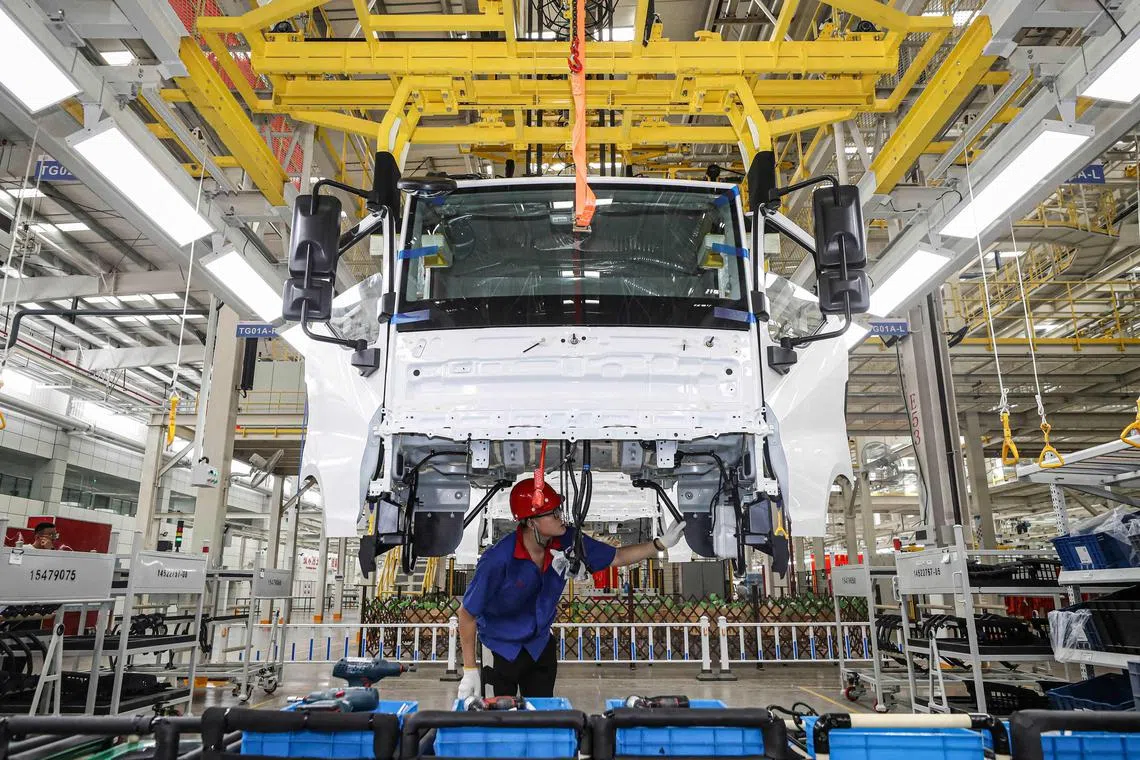China’s sputtering growth engines raise urgency for stimulus
Sign up now: Get ST's newsletters delivered to your inbox

China's manufacturing activity contracted for a fourth straight month in August.
PHOTO: AFP
BEIJING - China’s remaining growth engines are showing signs of sputtering while the property market continues to drag on the economy, highlighting the urgency of government intervention to keep an increasingly unlikely growth target in sight.
Factory activity contracted for a fourth straight month in August, according to an official poll of manufacturers.
The latest sales figures showed a worsening residential slump, after China Vanke – one of the nation’s biggest developers – underlined the industry’s woes late on Aug 30 by reporting a half-year loss for the first time in more than two decades.
Even the private Caixin manufacturing purchasing managers’ index (PMI) – which has tended to show stronger results – flashed warning signs, despite recovering to 50.4 in August after slipping into contraction in July.
The cost of production materials fell for the first time in five months, while manufacturers slashed selling prices to remain competitive.
“The challenges and difficulties in stabilising growth over the coming months will be substantial,” Caixin Insight Group senior economist Wang Zhe said in a statement accompanying the data release on Sept 2. “There is an increasingly urgent need for China to enhance policy support.”
Beijing has struggled to contain the property downturn and now faces the prospect of increasing protectionism and a shaky global outlook weighing on exports.
Several rounds of measures aimed at reviving domestic demand have done little to overcome the retreat, endangering the government’s growth target and spurring economists to call for additional stimulus.
The economic chill from China has shown signs of spreading across Asia. Taiwan’s manufacturing activity eased for a second straight month in August as confidence among firms fell to the lowest level in 2024 on concerns about the global economy, according to data from S&P Global.
Although Taiwan’s PMI still indicated an expansion, Indonesia’s PMI fell to the lowest in three years to remain stuck in contraction territory for a second consecutive month. The reading for South Korea improved but stayed below June’s level.
“We believe more fiscal easing is necessary to help secure the ‘around 5 per cent’ full-year growth target,” Goldman Sachs Group economists wrote in a note on China’s economy.
Year-to-date data shows rising risks that revenues from tax and land sales will fall short of the budget projection in 2024, they wrote. That will weigh on government spending if there is no upward revision to the official deficit target and no extra-budget quotas for government bond issuance.
Economists at banks such as UBS Group and JPMorgan Chase now expect China will fall short of delivering on its growth target.
Adding to the gloom, the official manufacturing PMI declined to 49.1 from 49.4 in July, the National Bureau of Statistics (NBS) said. The reading has been below the 50-point mark separating growth from contraction for all but three months since April 2023. Both the input-cost and output prices sub-indexes declined in August.
In a statement accompanying the PMI data, NBS analyst Zhao Qinghe attributed the latest contraction to high temperatures, heavy rainfall and a seasonal slackening of production in some industries. The non-manufacturing measure of activity in construction and services rose to 50.3, boosted by consumption during the summer holiday season, the statistics office said.
As trade tensions with the US and Europe increase, headwinds for the manufacturing sector are growing. For the mid-term outlook, much will depend on the outcome of the US election. Former US president Donald Trump has argued for 60 per cent tariffs on Chinese imports, while Vice-President Kamala Harris’ China policies are expected to be more in line with President Joe Biden’s approach.
On the property front,
The value of new-home sales from the 100 biggest real estate companies fell 26.8 per cent from a year earlier to 251 billion yuan (S$46.2 billion), faster than the 19.7 per cent decline in July, according to preliminary data from China Real Estate Information Corp.
At least 10 city governments have loosened or scrapped their new-home price guidance to let market demand play a bigger role, a move that is expected to drive more real estate companies to cut prices.
The growth headwinds have yet to result in a more forceful government response, with less than half of budgeted expenditure completed in the first seven months of 2024. On Aug 30, Finance Minister Lan Fo’an said the economy is still growing at a clip of 5 per cent, describing its performance in the first half as “generally stable and progressing steadily”.
But economists are calling for more support, especially if external demand wanes.
“The fiscal policy stance remains quite restrictive, which may have contributed to the weak economic momentum,” said Pinpoint Asset Management president and chief economist Zhang Zhiwei.
“To achieve economic stabilisation, the fiscal policy stance needs to become much more supportive. With the US economy slowing, exports may not be as reliable a source for growth as they were in the first half.” BLOOMBERG


